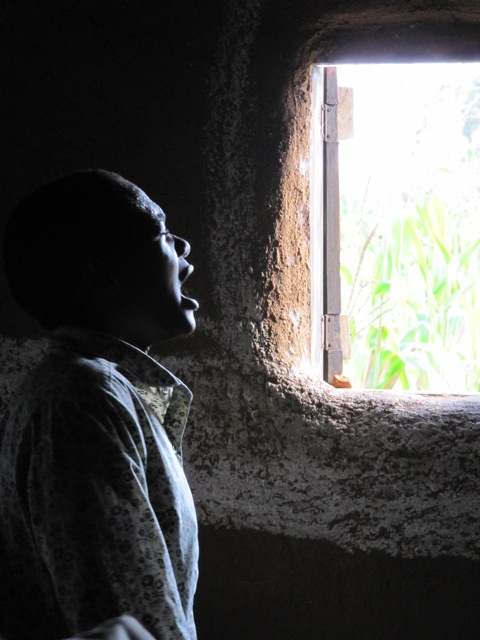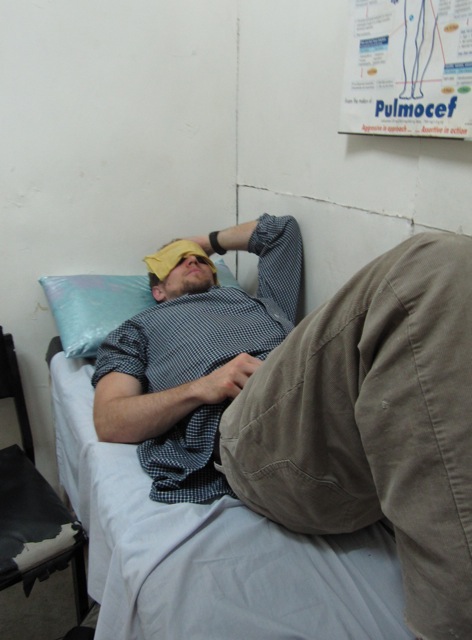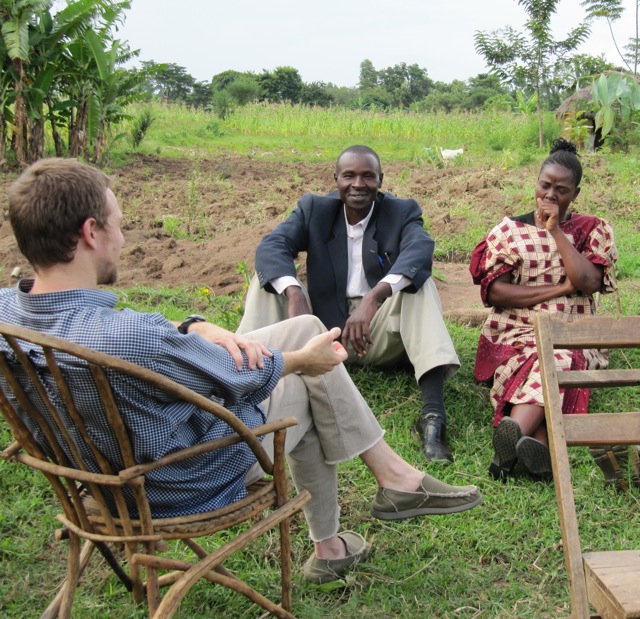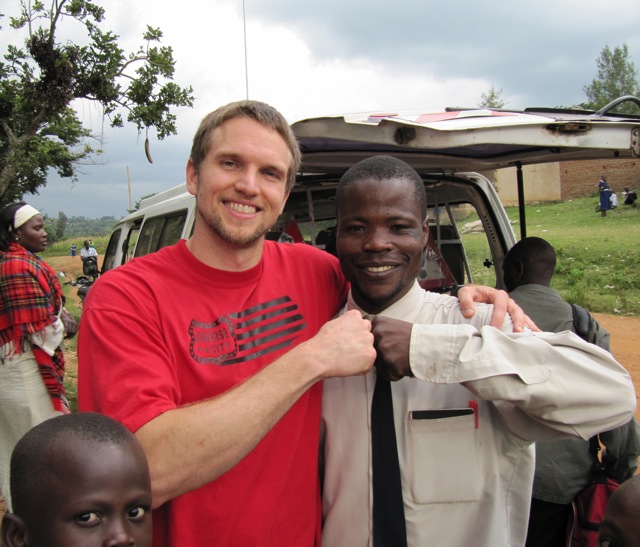
Out of Africa & Into the World

Africa is a special place right now – and not just because it hosted the World Cup. Africa has become the center of World Christianity. That might sound a bit wild to Western ears. We’re accustomed to thinking of Europe and North America as the Christian continents of the world. But that’s simply no longer the case. And as for the notion that “we took the gospel to Africa in the first place,” well, I’ll return to that in a moment.
In May I graduated from seminary, so now I’m doing a little celebratory trip around the world. Call it a victory lap if you’d like. Here’s the lineup: Berlin, Kenya, Cameroon, Dubai, India, Bangkok, New Zealand, and Mexico. I’ve just finished my time in Dubai and am currently in India (on a 25 hour train ride), but my experience in Africa has stayed with me. And it has stayed with me literally, too, since I came down with malaria after just five days.
I went to Kenya to teach in a seminary, then Cameroon to meet with local pastors along with my parents (my mom co-pastors a church in Dallas with a Cameroonian minister). One morning I awoke feeling quite ill, but by God’s grace was able to get through most of the day. I taught for three hours at the seminary, then in the afternoon preached in a church in the rural side. It was only in the evening after dinner that the fever and nausea became unbearable. On my way to the guest house where I was staying, I fainted and was taken to the hospital instead.

The experience of having malaria wasn’t completely negative, however. It gave me new perspective on missionary passion and pain. As I lay there in the hospital bed, my body temperature fluctuating between boiling hot and ice cold, I kept thinking about the missionaries that had come to this continent 125 years earlier.
Without a cure for malaria to yet be discovered, they knew that the majority of them would not live past the first year. So when they set sail, they packed their belongings in coffins. Even more fierce than the burning fever of malaria that took many of their lives was the burning passion for the spread of God’s glory that brought them to Africa to begin with.
The Great Global Shift
Those missionaries hoped and prayed that the seeds they planted would grow. But they didn’t just grow, they exploded. In 1900 there were only 9 million Christians in Africa. Today there are 380 million (compared to 260 million in North America). South America and Asia have experienced similar explosions – but not as drastic as Africa.
The last hundred years have seen an unprecedented movement in history as the center of gravity for World Christianity has shifted from North to South, and from West to East. Only 25% of the world’s Christians now live in North America, Europe, and Oceania (Australia and New Zealand). And at the center of this new global faith is the African church.
Although the theological base of Christianity has yet to experience this shift – meaning the West/North still account for the overwhelming majority of seminaries, Bible colleges, and teaching resources – this too will change in the years to come. Yale University historian Lamin Sanneh has said, “African Christianity is not just an exotic, curious phenomenon in an obscure part of the world…African Christianity might be the shape of things to come,” and theologian Andrew Walls states, “Theology that matters will be theology where the Christians are…It follows from this that what happens within the African churches in the next generation will determine the whole shape of Church history for centuries to come.”
I might add that this isn’t the first time Africa has found itself in this situation. People often don’t realize the importance of Africa in early Christian theology. Many of the church fathers (Christianity’s first theologians) were African, including Tertullian, Cyrpian, and most importantly, Saint Augustine who back in the fifth century set the course for Western theology.
So the answer to “Didn’t we take the gospel to Africa,” is both yes and no. Yes, the gospel was carried to Africa by European and American missionaries during the modern era, but it was Africa that gave us the gospel to begin with (and continues to do so considering how many of us still read Augustine and company). Christian history shows our need for one another.

From Every Tribe and Tongue
One thing I taught at the seminary was the importance of African pastors and leaders expressing their faith within their own culture. I remember being saddened years ago when I attended a church in the Philippines only to find the entire service was in English, with worship songs and even some of the sermon analogies imported straight from the U.S.A. This is one of the unfortunate legacies of missions done during the time of colonialism; Christianity was often mixed with Western culture, and then proclaimed as one and the same.
Contrast this with an experience I had in a Kenyan church last week (which is the setting of the first photo in this blog). At one point they pulled out a huge drum that looked like something their ancestors played on a hundred years ago around an open fire. They started banging wildly on it, jumping around, and singing their hearts out to Jesus – and all in their mother tongue. I was loving every moment of it. And I’m pretty sure God was, too.
I’m reminded of something the Ghanaian theologian Kwame Bediako wrote. “Christianity is, among all religions, the most culturally translatable, hence the most truly universal, being able to be at home in every cultural context without injury to its essential character.”
God never wills for Christianity to replace or suppress a culture which he, in fact, has created and loves. Instead, God’s dream is – according to Revelation 7 – that people from every culture, tribe, and tongue would know and worship him in their own uniqueness.
Christianity has no sacred culture or language. This is precisely why every culture is able to host the Christian faith. Though I should also say that the gospel will shatter certain aspects of every culture since no culture is weighty enough to hold the gospel and stay fully in tact.
Traveling Together
I guess the point of this post is to move us in America toward becoming global Christians, to help us recognize that we belong to a worldwide movement much bigger than what’s going on in our own little corner of the world.
Yes, we have a lot to offer and give to our African neighbors. There is great need for resources and organizational and leadership development. But like I said before, we also need them. I continue to be challenged by the faith and commitment of the African church. My four trips to the continent have left me with this conclusion: America is information rich, but spiritually poor; Africa is information poor, but spiritually rich.
Here are a few practical ways to become more connected with the African church. You can learn from how they read and interpret scripture, stay up with African news, or take a step back to look at the big global picture I’ve been describing. And perhaps your local church could learn a worship song or two in Swahili. The church I belonged to in Philly sang songs in different vernaculars as a way of having solidarity with Christians in other countries.
The Maasai tribe is one of the oldest in east Africa. They have a saying that goes like this: “If you want to travel fast, go alone. But if you want to travel far, go together.” Perhaps the picture below best captures what I’m trying to communicate.

There is much to glean from the missionary work done by our predecessors in the last two centuries. After my spell with malaria, I personally have a new appreciation for their passion and sacrifice. However, the old way of doing missions – characterized by one side giving and the other receiving – is no longer appropriate for our global situation. Partnership is the way forward. This will require humility on our side. It means mutually supporting each other, but in different ways, and working together to carry out God’s mission, for it’s only through traveling together that we’ll be able to travel far.